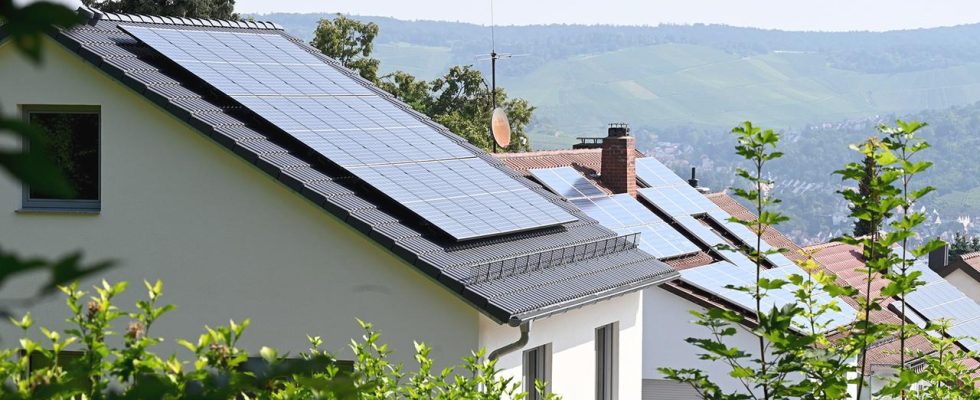background
The uncertainty surrounding the new calculation of property tax is high. The final notices are expected to be sent out this year. For some homeowners or landowners, the costs could rise massively.
A house in the middle of the city. This is great luck for Karl-Eugen Bleyler from Freiburg. He lives on the upper floor with his daughter and rents out the lower floor. In the backyard, hidden between the neighbors’ gardens, there is also a meadow – a place to relax in the green for all residents. This could cost Karl-Eugen Bleyler an enormous amount of money starting next year.
Previously, the meadow had a property tax of 85 euros per year. According to the new property tax model in Baden-Württemberg, it could be around 9,200 euros from 2025. Together with the property tax for the property on which his house stands, Bleyler would come to around 16,800 euros, as he calculated himself. So far he has paid 935 euros a year for both properties.
“That’s more than a hundred times higher. I mean, something’s not right,” says Bleyler. The homeowner is shocked.
No uniform regulations across the federal states
Baden-Württemberg has decided on a special approach to property tax reform. Only the size of the property and the so-called land value are used for the calculation. This varies depending on the area in which you live and is determined by a committee of experts. This means that in the future it will no longer matter whether there is a villa or a shed on the property. The new regulation will significantly reduce the burden on tax offices, as each house does not have to be valued individually.
Different than in other federal states. Eleven federal states follow the federal model, which includes the type of building in the calculation. In addition to Baden-Württemberg, Hamburg, Hesse, Bavaria and Lower Saxony have their own procedure for assessing property tax.
“Incentive to create living space”
The tax office in Stuttgart emphasizes the advantages of the model there. Undeveloped land could become more expensive, but: “There is an incentive in this model to build on these land and thus create living space,” says Gisela Splett, State Secretary in the Ministry of Finance.
Homeowner Bleyler cannot and is not allowed to build on his lawn. In Freiburg, people value the large gardens for climate protection reasons and definitely want to keep them.
Bleyler is not alone in his anger over the implementation of the reform. According to estimates by the federal chairman of the German Tax Union, Florian Köbler, around a third of all of Germany have lodged objections to the notices.
Associations consider models for unconstitutional
The reason for the high objection rates is probably the model lawsuits, which are supported by several associations, such as the Taxpayers’ Association. They consider both the federal model and the model in Baden-Württemberg to be unconstitutional.
In Baden-Württemberg, the lawsuit is currently before the state’s financial court. If it is rejected, the associations want to appeal. In the end, the Federal Constitutional Court would have to decide. It could be years before then. However, the lawsuit has no suspensive effect. Property tax must be paid from January 1, 2025.
Berlin has significantly reduced the assessment rate
How much property tax will be due from the new year can only be finally calculated once the municipalities have set their assessment rate for 2025. A factor by which the property value, i.e. area and land value, is multiplied. Cities and municipalities determine it independently. In Freiburg with Karl-Eugen Bleyler it is not yet clear what will apply from 2025. If one assumes the previous assessment rate, he will actually have to pay the 16,800 euros in property tax from next year.
Florian Köbler from the German Tax Union appeals to municipalities to set the assessment rates as soon as possible. “This would finally provide clarity and for many people the fear of high costs could also disappear.”
The city of Berlin recently significantly reduced its assessment rate. In many small communities the assessment rate was also increased. Property tax is one of the most important sources of income for municipalities.
The property tax reform should actually not lead to higher costs overall. However, there may be shifts within the municipalities. This means that the property tax will decrease for some properties and increase for others. It remains to be seen whether this will be balanced in the end or whether municipalities will use the opportunity to replenish their empty coffers.
Costs can be passed on to tenants
In the case of Karl-Eugen Bleyler, Andrea Schmid-Förster from the Taxpayers’ Association in Baden-Württemberg advises a counter-evaluation. This is possible in Baden-Württemberg. This would allow him to prove that his meadow should not be built on. However, the costs for this lie with him. These could range from several hundred to more than a thousand euros.
Karl-Eugen Bleyler initially plans to pass on the higher property tax to the tenants in his Wilhelminian style house. The rent would therefore rise next year – by 175 euros per month.

